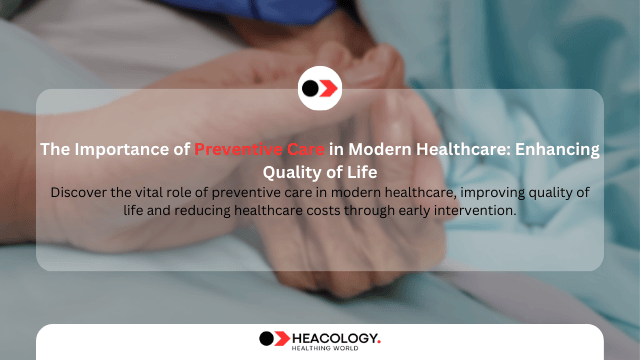The Importance of Preventive Care in Modern Healthcare
Preventive care, also known as preventive healthcare, is a proactive approach to maintaining health and well-being. It focuses on disease prevention and health promotion, ensuring individuals maintain an optimal quality of life. This article will delve into the significance of preventive care in modern healthcare, its benefits, and its impact on various aspects of health and society.
Understanding Preventive Care
Preventive care involves a range of services aimed at preventing illnesses, detecting diseases at an early stage, and managing health conditions before they become severe. These services include health screenings, immunizations, regular check-ups, and wellness programs. By prioritizing prevention, healthcare providers can identify potential health issues early and take appropriate action to mitigate risks.
The Evolution of Preventive Care
The concept of preventive health has evolved significantly over the years. Historically, healthcare systems focused primarily on treating diseases after they occurred. However, with advancements in medical science and a better understanding of disease mechanisms, there has been a paradigm shift towards prevention. Modern healthcare now emphasizes the importance of early detection and intervention to improve health outcomes and reduce healthcare costs.
Key Components of Preventive Care
Health Screenings
Regular health screenings are a cornerstone of preventive care. They help identify risk factors and detect diseases at an early stage when they are more manageable. Common screenings include mammograms, blood pressure checks, cholesterol tests, and cancer screenings. For example, a novant mammogram can detect breast cancer early, significantly improving treatment outcomes.
Immunizations
Vaccinations play a crucial role in preventive healthcare by protecting individuals from infectious diseases. Immunizations not only prevent illnesses but also contribute to herd immunity, reducing the spread of diseases within communities.
Wellness Programs
Wellness programs are designed to promote healthy behaviors and prevent chronic conditions. These programs often include lifestyle education, fitness activities, and nutrition counseling. By encouraging healthy habits, wellness programs help individuals maintain their quality of life and prevent the onset of diseases.
Early Intervention
Early intervention is a critical aspect of preventive care. By identifying and addressing health issues early, healthcare providers can prevent complications and improve patient outcomes. Early intervention is particularly important for managing chronic conditions such as diabetes, hypertension, and heart disease.
The Benefits of Preventive Care
Improved Quality of Life
Preventive care directly impacts the quality of life by keeping individuals healthy and active. Regular check-ups, screenings, and healthy lifestyle choices help prevent diseases and manage existing conditions effectively, allowing individuals to lead fulfilling lives.
Reduced Healthcare Costs
Investing in preventive healthcare can lead to significant cost savings for both individuals and healthcare systems. Preventing diseases and managing conditions early reduces the need for expensive treatments and hospitalizations. For instance, managing high blood pressure through lifestyle changes and medication can prevent costly complications such as heart attacks and strokes.
Better Management of Chronic Conditions
Chronic conditions like diabetes, heart disease, and asthma can be managed more effectively through preventive care. Regular monitoring, lifestyle modifications, and medication adherence can prevent these conditions from worsening, improving patients' overall health and reducing the burden on healthcare systems.
Enhanced Mental Health
Preventive care also addresses mental health by promoting emotional well-being and preventing mental issues. Mental health screenings, counseling, and stress management programs are essential components of preventive care, helping individuals maintain a healthy mind.
Increased Longevity
By preventing diseases and promoting healthy behaviors, preventive care contributes to increased longevity. Individuals who engage in preventive healthcare measures are more likely to live longer, healthier lives.
Preventive Care in Different Life Stages
Early Childhood Programs
Early childhood programs focus on promoting healthy development in children. These programs include vaccinations, growth monitoring, and health education for parents. By addressing health issues early in life, these programs lay the foundation for a healthy future.
Adult Preventive Care
Preventive care for adults involves regular health check-ups, screenings, and lifestyle counseling. Adults are encouraged to undergo routine screenings for conditions such as hypertension, diabetes, and cancer. Maintaining a healthy lifestyle through diet, exercise, and stress management is also emphasized.
Geriatric Preventive Care
For older adults, preventive care focuses on managing chronic conditions, maintaining mobility, and preventing falls. Regular screenings for osteoporosis, vision and hearing tests, and vaccinations are crucial for this age group. Geriatric preventive care aims to enhance the quality of life and independence of older adults.
The Role of Healthcare Providers
Primary Care Physicians
Primary care physicians play a pivotal role in preventive care. They provide comprehensive health assessments, coordinate screenings, and offer personalized health advice. By building long-term relationships with patients, primary care physicians can effectively manage their overall health.
Specialists and Preventive Care
Specialists such as cardiologists, endocrinologists, and oncologists contribute to preventive care by offering specialized screenings and early interventions. For example, a cardiologist may recommend lifestyle changes and medications to prevent heart disease in high-risk patients.
Health Educators
Health educators are essential in promoting preventive care. They provide valuable information on healthy lifestyles, disease prevention, and available health services. Through community outreach and educational programs, health educators empower individuals to take charge of their health.
Preventive Care in the Workplace
Employee Healthcare Programs
Employee healthcare programs are designed to promote health and well-being in the workplace. These programs often include health screenings, wellness challenges, and stress management workshops. By investing in preventive care, employers can reduce absenteeism, enhance productivity, and improve employee satisfaction.
Health Insurance for Small Companies
Small businesses can benefit from offering health insurance for small companies that includes preventive care services. Providing access to preventive care helps employees stay healthy and reduces the long-term costs associated with chronic diseases.
Benefits of Employer-Sponsored Preventive Care
Employers who offer preventive care services as part of their health insurance packages see a range of benefits. These include lower healthcare costs, improved employee retention, and a healthier workforce. Preventive care services such as vaccinations, screenings, and wellness programs are valuable additions to employer-sponsored health plans.
The Impact of Preventive Care on Society
Public Health Initiatives
Preventive care is integral to public health initiatives aimed at reducing disease burden and improving population health. Programs such as vaccination drives, anti-smoking campaigns, and obesity prevention initiatives are examples of preventive care efforts at the community level.
Reducing Healthcare Disparities
Preventive care helps reduce healthcare disparities by providing equitable access to health services. By ensuring that all individuals, regardless of socioeconomic status, have access to preventive care, healthcare systems can address health inequities and improve outcomes for vulnerable populations.
Enhancing Community Health
Preventive care contributes to healthier communities by reducing the prevalence of diseases and promoting overall well-being. Communities with robust preventive care programs experience lower rates of chronic diseases, reduced healthcare costs, and improved quality of life.
The Future of Preventive Care
Technological Advancements
Advancements in technology are shaping the future of preventive care. Innovations such as telemedicine, wearable health devices, and artificial intelligence are enhancing the ability to monitor health, detect diseases early, and provide personalized preventive care.
Integrating Mental and Physical Health
The future of preventive care will see a greater integration of mental and physical health services. Recognizing the interconnection between mental and physical health, healthcare providers will offer comprehensive care that addresses both aspects of well-being.
Expanding Access to Preventive Services
Efforts to expand access to preventive care will continue to grow. Policymakers, healthcare providers, and community organizations will work together to remove barriers and ensure that preventive services are available to all individuals.
FAQs
What is the importance of preventative health care?
Preventative health care is essential as it focuses on preventing diseases, promoting overall health, and improving the quality of life. It involves regular health screenings, immunizations, and wellness programs to detect potential health issues early, reducing the need for costly treatments and improving long-term health outcomes.
Why is preventive treatment important?
Preventive treatment is important because it helps identify and address health issues before they become severe. By catching diseases early through screenings and regular check-ups, individuals can receive timely interventions, leading to better health outcomes and reduced healthcare costs.
What is the importance of a preventive approach?
A preventive approach is important because it emphasizes maintaining health and preventing disease rather than merely treating symptoms. This proactive stance helps reduce the incidence of chronic conditions, enhances quality of life, and lowers the overall burden on healthcare systems.
Why is prevention important in health and social care?
Prevention is crucial in health and social care as it helps maintain the well-being of individuals and communities. By focusing on preventive measures, such as health education, screenings, and immunizations, healthcare providers can reduce the prevalence of diseases, improve mental health, and create healthier, more resilient communities.
Conclusion
Preventive care is a vital component of modern healthcare that offers numerous benefits, including improved quality of life, reduced healthcare costs, and better management of chronic conditions. By prioritizing early detection, wellness programs, and regular health screenings, individuals can lead healthier, more fulfilling lives. Healthcare providers, employers, and policymakers must continue to support and promote preventive care to build a healthier future for all. Embracing preventive care is not only a smart health decision but also a crucial step towards a sustainable and equitable healthcare system.










Your Opinion Is Important For Us!